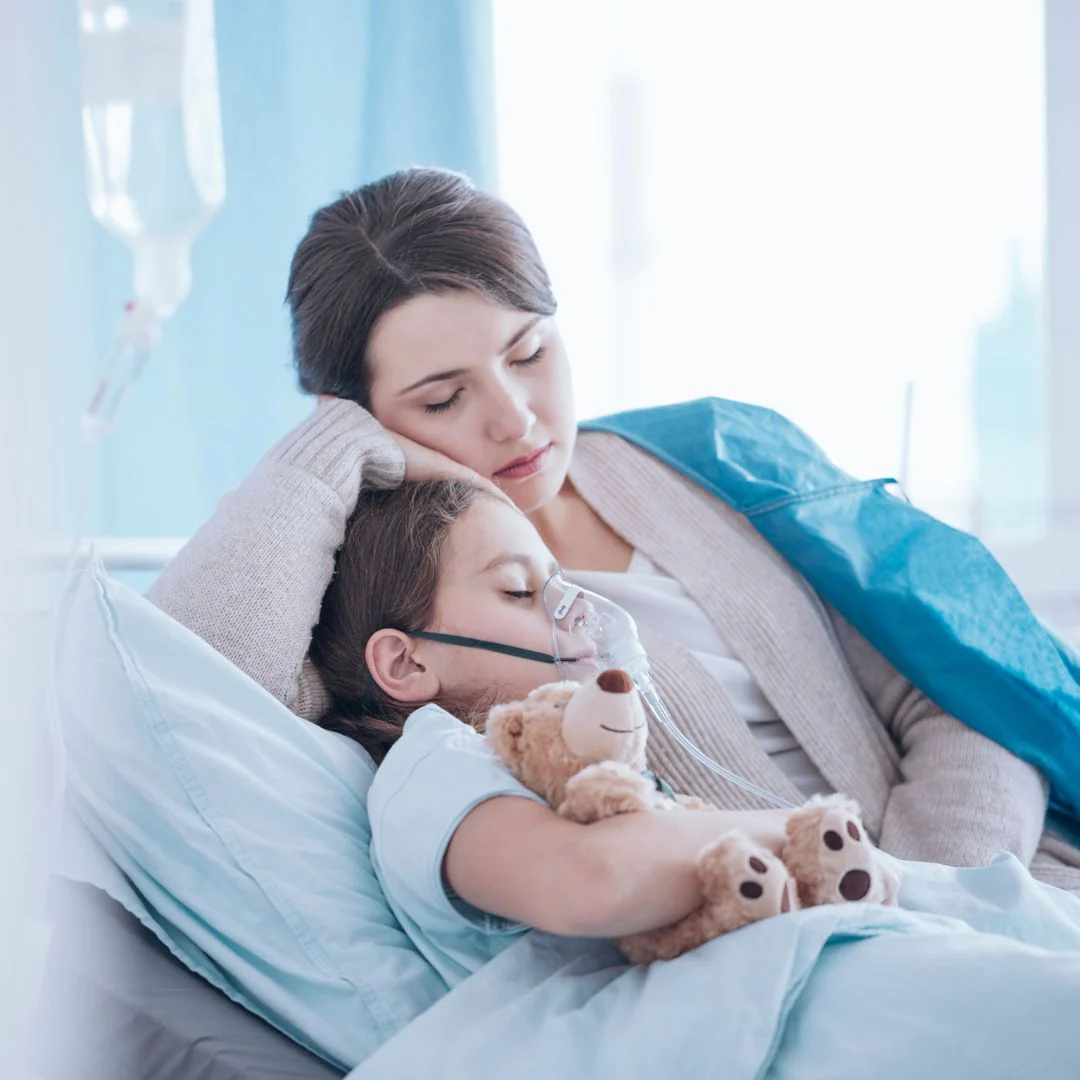
Key facts
- The most common signs of illness in children include a fever, sore throat, a blocked or runny nose, and a rash.
- A child who has a fever, is vomiting, or who has mucus in their eyes should not go to school or day care.
- It’s normal for children to get mild illnesses, but you can help your child stay well by arranging on-time vaccinations, and teaching them good hygiene practices.
- If your child’s symptoms don’t improve after 2 days, or they get worse, your child should see a doctor.
How can I tell if my child is sick?
One of the most common signs of illness in children is a fever. If your child is ill, you may also notice these signs:
- sore throat or headache
- blocked or runny nose
- sneezing or coughing
- a rash that appears suddenly on their skin
- vomiting or diarrhoea
- glazed eyes
- drowsiness/lethargy or a low appetite
Other signs that your child might be sick include a change in breathing patterns, such as shallow breathing or pausing between breaths, or a change in the colour of their skin, making it appear pale or blotchy. Your child may show a lack of energy or have little interest in activities they usually enjoy, and they might be less inclined to run around, preferring quiet activities or to rest.
What are some of the most common childhood illnesses?
Common childhood illnesses include:
- the common cold
- bronchitis
- laryngitis
- sinusitis
- ear infections
- croup
- pneumonia
- whooping cough
- chickenpox (varicella)
- gastroenteritis (‘gastro’)
- hand, foot and mouth disease.
These illnesses are very common. Germs spread quickly among young children because they play closely together and touch the same surfaces — at home, in childcare or at the playground. Children also don’t cover up as well as adults when they cough or sneeze and this helps to spread germs. Good hygiene is very important: once they are old enough, teach your child to cover their mouth when they sneeze, not to share food or utensils, and to wash their hands well.
Allergies cause symptoms that are commonly mistaken for a cold or the flu. Many children have allergies to particular foods (such as dairy, tree-nuts or peanuts) or triggers in the environment (such as dust mites). Allergy symptoms vary from mild to severe, and a severe allergic reaction (anaphylaxis) is a medical emergency. Signs of anaphylaxis include a change in breathing, pale skin or a swollen tongue.
If you think your child has had a mild allergic reaction, their doctor can arrange an allergy test.
Should I keep my child home from school or daycare?
While it can be hard to know whether to keep your child at home when they are not feeling well, there are some signs to look out for. Keep your child home if they have:
- fever (a temperature above 37.5 degrees Celsius)
- nausea with vomiting
- diarrhoea
- sore eyes with pus or mucus
- sore throat
- bad cough
- rash or skin sores, especially on the face, hands and feet
If your child is feeling generally unwell, and has a runny nose, low energy levels or little appetite, you may want to keep a closer watch. Assess their health for a few hours before deciding whether they should stay home for the day.
It is very important to keep children home when they are sick so as to minimise the risk of spreading disease to other children, staff members and their families. In particular, viruses spread quickly when there is close contact and cause many of the diseases that are common among young children — especially when a child is coughing, sneezing or has a runny nose.
When should I take my child to the doctor?
If your child’s symptoms do not improve after 2 full days, or you are concerned about their health, it’s always best to see a doctor. Seeing the doctor early on in an illness can often prevent it from getting worse, and becoming a more severe disease. It may also prevent the spread of the illness and allow your child to return to their regular routine sooner.
Other signs that it may be time to see the doctor include when:
- paracetamol and ibuprofen aren’t helping
- the child experiences continuous bouts of vomiting or diarrhoea
- they have a high fever for 2 full days
- they won’t drink any fluids for more than 6 hours
- they have a rash
- they urinate (wee) very infrequently (or have less than half the usual number of wet nappies)
Seek medical care immediately from your doctor or nearest hospital if your child:
- is very pale or is uncharacteristically difficult to wake up
- is having trouble breathing
- has a fever with back or neck pain
- has a rash with red or purple ‘pin prick’ spots or blotches that don’t turn white when you press on them — this may be a meningitis rash.
Young babies are especially vulnerable. If your child is less than 3 months old, you should see a doctor if they aren’t feeding well or have a fever. If your child is less than 1 month old and has a fever seek emergency care (for example, at your nearest hospital emergency department).
How can I prevent my child from getting sick?
Effective vaccines are available that will help prevent your child from catching many common childhood illnesses, such as chicken-pox.
In addition to vaccination, you can help protect your child from infectious illnesses by teaching them good hygiene practices. These include:
- washing hands well with soap, or using hand sanitiser, especially before eating
- not sharing food, cutlery, drink bottles, sheets or clothes in childcare
- teaching children to sneeze and cough into their elbows
- throwing tissues into the bin straight after use
- keeping away from sick children
It is also important to ensure your child gets enough sleep and eats a balanced diet to help support a healthy immune system.
How do I know if my child’s vaccinations are up to date?
Your child’s vaccination records can be found on the myGov website, where you can check their medical information. The National Immunisation Program (NIP) Schedule sets out when and how many doses of a vaccine your child needs, based on their age and other details. If your child has missed a vaccination, speak to your doctor about a catch-up dose. Most vaccinations are offered free of charge.
How can I help my child recover?
The best way to help your child recover is to allow them to rest at home since this will help their body fight the illness. Offer your child ample amounts of fluids to avoid dehydration. If they don’t want to drink water, ice blocks or soup are good alternatives.
If your child has a fever and is uncomfortable or in pain, paracetamol or ibuprofen may help. Always follow the dosing information on each pack carefully before use. Do not give your child aspirin.
Ibuprofen and other anti-inflammatory medicines can trigger asthma symptoms in a small number of children who already have asthma. Children with ibuprofen-induced asthma may also have an increased risk of developing side effects. Your doctor or pharmacist can help you decide whether your child needs to avoid taking ibuprofen.
It’s quite normal for your child to need extra attention while unwell, and young babies may want more cuddles than usual.
Other questions you might have
My child seems to be constantly catching colds. What can I do?
Even a healthy child can catch up to 12 minor illnesses — such as a cold — each year, and so this is very normal. Sometimes, a child will catch a virus shortly after recovering from a different virus, so it seems like they are constantly sick. Many kids catch fewer cold viruses as they get older and their immune system gets stronger. Teach your child good hygiene practices, including washing their hands properly, to help protect them from illnesses. If you are worried about how often your child gets sick, speak to your doctor.
Should I let my child sleep when they’re not feeling well?
The best way for you to help your child recover is to let them to rest, allowing their immune system to fight the illness. Don’t be concerned if your child is sleeping more than usual or eating less for a few days. If this continues for an extended period of time, consult your doctor.
Should I wake a sick child to give them medicine?
If your child has been prescribed antibiotics for an infection caused by bacteria, they will need to take the antibiotic at regular intervals for it to be effective. Therefore, you may need to wake your child when it’s time to take the next dose.
Paracetamol and ibuprofen are given when your child is uncomfortable due to fever or pain. If your child is sleeping, there is no need to wake them to give them these medicines.



